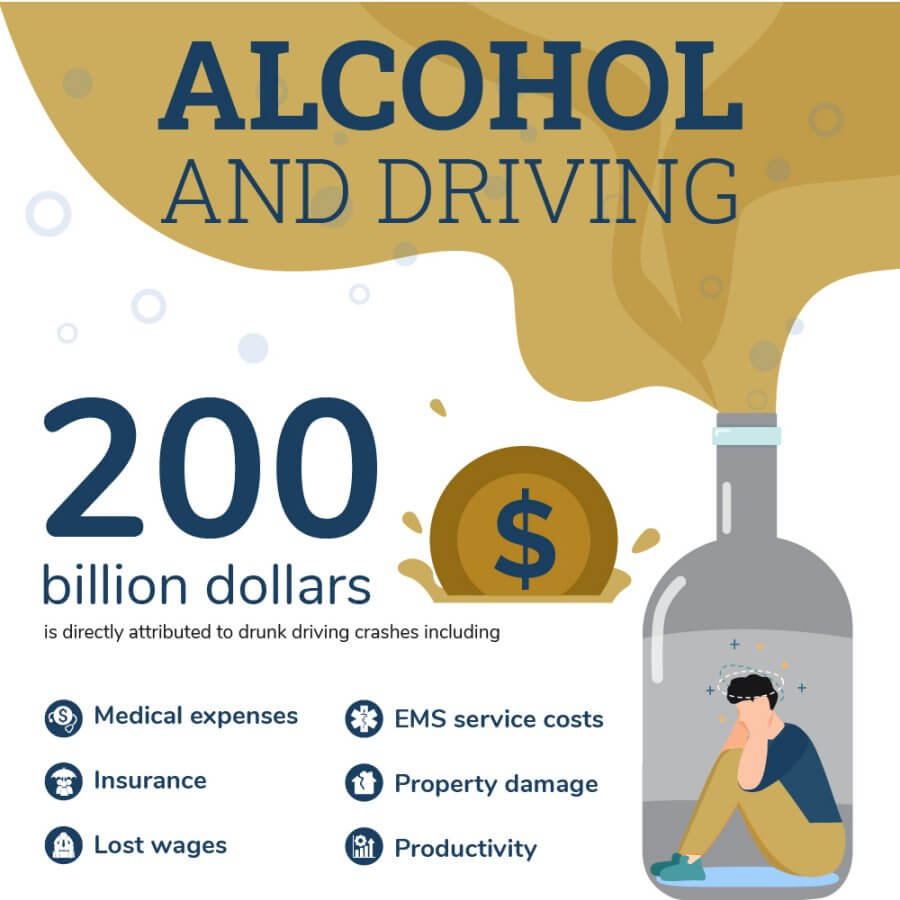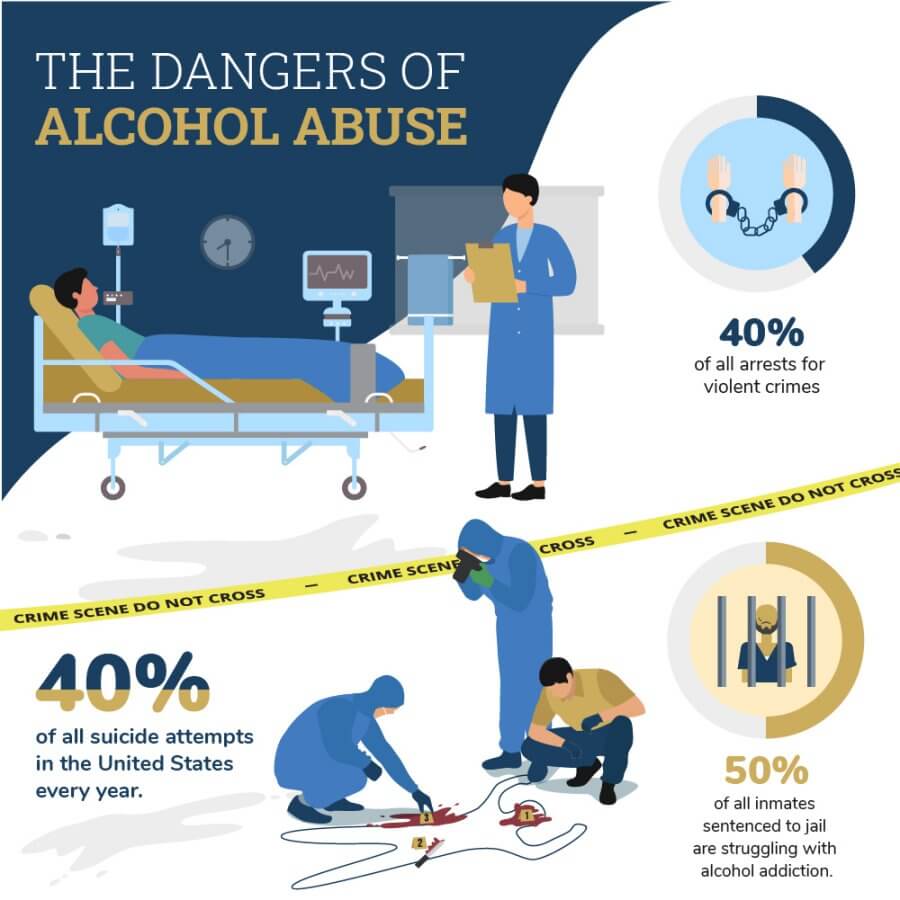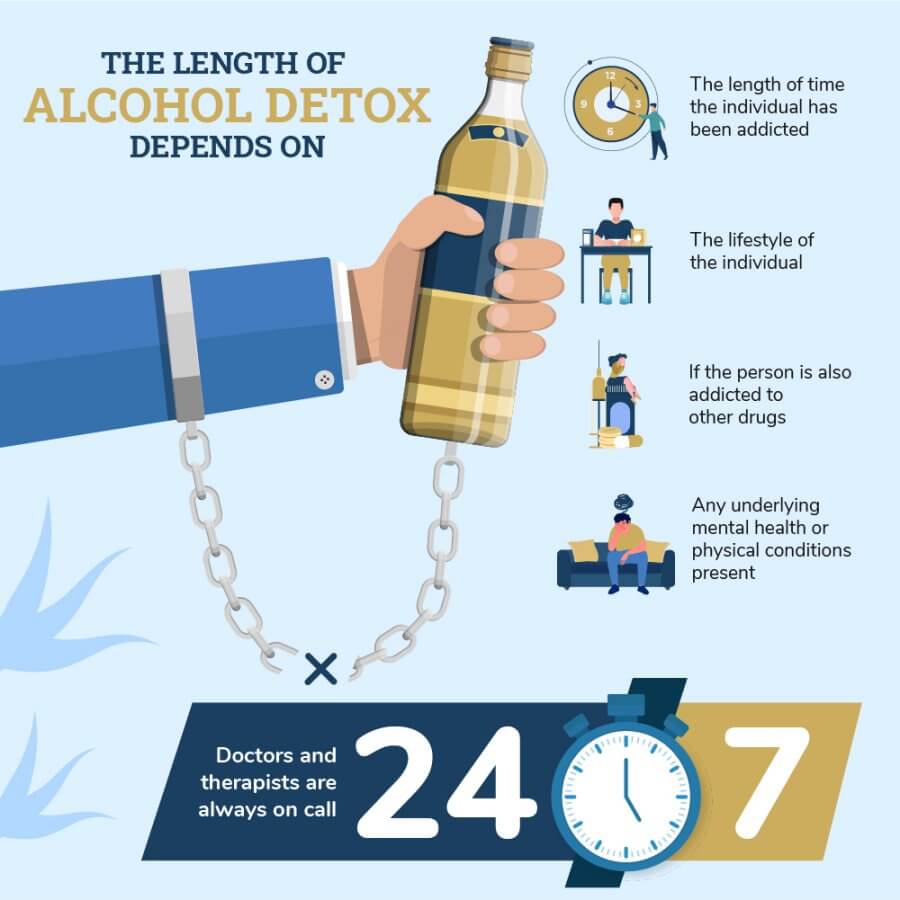Alcohol Withdrawal Syndrome (AWS) is primarily caused by the sudden reduction or cessation of alcohol consumption in individuals who have developed a physical dependence on alcohol. Several risk factors can increase the likelihood of developing AWS, including:
Heavy and Prolonged Alcohol Use: Regularly consuming large amounts of alcohol over an extended period significantly increases the risk.
History of Previous Withdrawal Episodes: Individuals who have experienced withdrawal symptoms in the past are more likely to experience them again.
Co-occurring Medical or Psychiatric Conditions: Existing health issues can exacerbate the symptoms of AWS.
Family History of Alcoholism: Genetics can play a role in the likelihood of developing alcohol dependence and AWS.
Age: Older adults are more susceptible to AWS due to the cumulative effects of long-term alcohol use.
Use of Other Substances: Concurrent use of other substances can complicate and intensify withdrawal symptoms.
The National Institute on Alcohol Abuse and Alcoholism (NIAAA) defines heavy drinking as consuming four or more drinks per day for men and three or more drinks per day for women. Individuals who meet or exceed these levels of alcohol use are at a higher risk of developing AWS.
We are committed to providing a comfortable and effective place for clients to get clean and begin their journey in recovery. Your recovery is our number ONE priority at Asana Recovery. Call us today.
Saving lives. Supporting families. Strengthening communities.


Alcohol impairment is dangerous for all drivers but especially commuters. Every day 29-32 people in the US die from drunk driving accidents. Drunk driving crashes cost more than 44 million dollars a year. 200 billion dollars is directly attributed to drunk driving crashes including:
Medical
Insurance
Lost wages
EMS service
Property damage
Productivity
Anyone driving with a BAC or blood alcohol level above the .08 legal limit can be fined or sentenced to jail time. They can lose their license for several years. More lost productivity and wages. The average cost of drunk driving charges, jail time, insurance, attorney fees and impound is $10,000 to $15,000. More stress for someone already addicted to alcohol.


Cravings for alcohol
Irritability
Financial problems
Can’t do anything without drinking first
Feelings of guilt
Legal issues like car accidents and DUIs
Drinking in secret or alone
Injuries from alcohol impairment
Withdrawal symptoms like anxiety or sweating
Relationship problems
Drinking as soon as they wake up in the morning
Can’t control or stop drinking no matter the consequences
Smells of alcohol

Start your recovery journey with us at Asana Recovery,
where we prioritize your well-being and provide
a welcoming environment for you to heal.

Alcohol withdrawal symptoms will include hallucinations, agitation, anxiety, and confusion, especially in individuals with alcohol use disorders. Long term issues with emotional regulation and memory problems can occur. Even after they’re recovered from active addiction they will struggle with occasional cravings. In most cases this will be followed by a clinical depression episode.
Support and ongoing therapy from the community and loved ones is key for someone with an alcohol addiction to stay sober and deal with long term issues in a healthy and positive way. If they don’t get help they will harm themselves or relapse.
Severe alcohol withdrawal is a critical condition that demands immediate medical attention. It is characterized by intense and potentially life-threatening symptoms, including:
Delirium Tremens (DTs): A severe form of withdrawal that includes sudden and severe mental or nervous system changes.
Seizures: Uncontrolled electrical disturbances in the brain that can lead to convulsions.
Hallucinations: Seeing, hearing, or feeling things that are not there.
Coma: A state of prolonged unconsciousness.
Respiratory Depression: Slow and ineffective breathing that can be fatal.
Individuals with a history of heavy and prolonged alcohol use, especially those who have experienced previous withdrawal episodes, are at a higher risk of severe alcohol withdrawal. The onset of severe symptoms necessitates immediate medical intervention to prevent complications and ensure the safety of the individual. If you or someone you know is experiencing severe symptoms of alcohol withdrawal, it is crucial to seek medical help without delay.
By understanding the complexities of alcohol withdrawal syndrome and recognizing the risk factors and severe symptoms, individuals and their loved ones can better prepare for the challenges of recovery and seek the necessary medical support.
At Asana Recovery, we understand the challenges of alcohol addiction and withdrawal. Our team is dedicated to providing personalized, compassionate care through a range of treatment programs designed to help you recover safely and effectively. No matter where you are in your recovery journey, we have the right program for you:
Contact us today to start your recovery journey. Our team is here to help you every step of the way.
Quitting without medical supervision is not safe. Especially if the person has been drinking for a long time. If they quit cold turkey the symptoms of withdrawal will be more intense or worse. A medical detox is needed to taper off the alcohol under the care of a doctor. The doctor can also prescribe benzodiazepines to help the person taper off the alcohol.
People in recovery can taper off alcohol with the following:
Anti-anxiety medication
Sleep aids short term only
Benzodiazepines
Mood stabilizers
Small amounts of alcohol
Doctors in a medical detox center are on call 24/7 to help with severe withdrawal symptoms. If the person experiences a heart arrhythmia or delirium tremens they can keep them safe by addressing the issue quickly. Detoxing at home is not recommended because the person doesn’t have the supervision and medical help they need.
More alcohol or illegal drugs are not safe during detox. Detoxing at home without proper support or medical help is dangerous because the person can develop life threatening conditions, get hurt and die.
People in recovery are at high risk of having suicidal thoughts or attempting suicide due to severe depression. Family members don’t have the training or experience to handle these complications. A professional support system must be in place for all recovering alcoholics to stay safe and sober for life.
The first step for anyone addicted to alcohol is to enter a medical detox. A doctor will then assess the person for any health conditions. The person is then evaluated and treated for any underlying mental or physical issues. Replacement medications are used to help the person detox safely. Withdrawal symptoms are managed with prescription medication.
Once the worst of the withdrawal symptoms have passed the person will start working with a therapist. This is when the person will learn how to overcome the issues that led to their alcohol addiction. The therapist will develop coping mechanisms and plans to help the person stay sober when they leave the facility. The length of time the person will need to stay in the facility is determined by:
How long the person has been addicted
The person’s lifestyle
If the person is also addicted to other drugs
Any underlying mental or physical conditions
These factors will determine what type of therapy is best for each situation. Sometimes one on one therapy is all that’s needed. Other times family and group therapy is beneficial. Patients in a rehab center have access to multiple types of treatment to meet their needs. Doctors and therapists are on call 24/7.
Therapists will teach patients how to cope when they leave the facility and live their best life. One of the benefits of a rehab facility is patients spend time with each other. This is good because they are all going through the same thing. Patients understand and support each other for everything they are feeling and going through. Rehab facilities also have integrated and holistic treatment.
The treatments and progressive therapy was developed with the understanding the whole person needs to heal. Patients have access to many different therapies, often including sports therapy, art therapy, relaxation therapy, yoga and massage. These types of therapy have been proven to work for people with long term alcohol addiction and those who have relapsed. Alcohol addiction is different for each person because we are all unique.
Sometimes alcohol abuse is a result of suffering from other mental health conditions. Inpatient rehab centers and medical detox facilities are the best option for treatment for people with unique circumstances. Some people are struggling because they are also addicted to other substances or drugs along with alcohol.
To stay sober these people need the support of their family while working with trained social workers, doctors and therapists. Don’t hesitate to get alcohol abuse treatment for your loved one. Talk to a licensed therapist through medical detox centers. It’s never easy to ask for help. The admissions counselor will walk you through the entire process and go over all the treatment options.
All private. Get your loved one help now. Learn more Asana Recovery.
© Copyright 2024 Asana Recovery™ | All Rights Reserved | Privacy Policy
Asana Recovery
We firmly believe that the internet should be available and accessible to anyone, and are committed to providing a website that is accessible to the widest possible audience, regardless of circumstance and ability.
To fulfill this, we aim to adhere as strictly as possible to the World Wide Web Consortium’s (W3C) Web Content Accessibility Guidelines 2.1 (WCAG 2.1) at the AA level. These guidelines explain how to make web content accessible to people with a wide array of disabilities. Complying with those guidelines helps us ensure that the website is accessible to all people: blind people, people with motor impairments, visual impairment, cognitive disabilities, and more.
This website utilizes various technologies that are meant to make it as accessible as possible at all times. We utilize an accessibility interface that allows persons with specific disabilities to adjust the website’s UI (user interface) and design it to their personal needs.
Additionally, the website utilizes an AI-based application that runs in the background and optimizes its accessibility level constantly. This application remediates the website’s HTML, adapts Its functionality and behavior for screen-readers used by the blind users, and for keyboard functions used by individuals with motor impairments.
If you’ve found a malfunction or have ideas for improvement, we’ll be happy to hear from you. You can reach out to the website’s operators by using the following email
Our website implements the ARIA attributes (Accessible Rich Internet Applications) technique, alongside various different behavioral changes, to ensure blind users visiting with screen-readers are able to read, comprehend, and enjoy the website’s functions. As soon as a user with a screen-reader enters your site, they immediately receive a prompt to enter the Screen-Reader Profile so they can browse and operate your site effectively. Here’s how our website covers some of the most important screen-reader requirements, alongside console screenshots of code examples:
Screen-reader optimization: we run a background process that learns the website’s components from top to bottom, to ensure ongoing compliance even when updating the website. In this process, we provide screen-readers with meaningful data using the ARIA set of attributes. For example, we provide accurate form labels; descriptions for actionable icons (social media icons, search icons, cart icons, etc.); validation guidance for form inputs; element roles such as buttons, menus, modal dialogues (popups), and others. Additionally, the background process scans all the website’s images and provides an accurate and meaningful image-object-recognition-based description as an ALT (alternate text) tag for images that are not described. It will also extract texts that are embedded within the image, using an OCR (optical character recognition) technology. To turn on screen-reader adjustments at any time, users need only to press the Alt+1 keyboard combination. Screen-reader users also get automatic announcements to turn the Screen-reader mode on as soon as they enter the website.
These adjustments are compatible with all popular screen readers, including JAWS and NVDA.
Keyboard navigation optimization: The background process also adjusts the website’s HTML, and adds various behaviors using JavaScript code to make the website operable by the keyboard. This includes the ability to navigate the website using the Tab and Shift+Tab keys, operate dropdowns with the arrow keys, close them with Esc, trigger buttons and links using the Enter key, navigate between radio and checkbox elements using the arrow keys, and fill them in with the Spacebar or Enter key.Additionally, keyboard users will find quick-navigation and content-skip menus, available at any time by clicking Alt+1, or as the first elements of the site while navigating with the keyboard. The background process also handles triggered popups by moving the keyboard focus towards them as soon as they appear, and not allow the focus drift outside it.
Users can also use shortcuts such as “M” (menus), “H” (headings), “F” (forms), “B” (buttons), and “G” (graphics) to jump to specific elements.
We aim to support the widest array of browsers and assistive technologies as possible, so our users can choose the best fitting tools for them, with as few limitations as possible. Therefore, we have worked very hard to be able to support all major systems that comprise over 95% of the user market share including Google Chrome, Mozilla Firefox, Apple Safari, Opera and Microsoft Edge, JAWS and NVDA (screen readers).
Despite our very best efforts to allow anybody to adjust the website to their needs. There may still be pages or sections that are not fully accessible, are in the process of becoming accessible, or are lacking an adequate technological solution to make them accessible. Still, we are continually improving our accessibility, adding, updating and improving its options and features, and developing and adopting new technologies. All this is meant to reach the optimal level of accessibility, following technological advancements. For any assistance, please reach out to